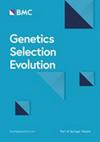Multitrait genome-wide association best linear unbiased prediction of genetic values
IF 3.6
1区 农林科学
Q1 AGRICULTURE, DAIRY & ANIMAL SCIENCE
引用次数: 0
Abstract
The GWABLUP (Genome-Wide Association based Best Linear Unbiased Prediction) approach used GWA analysis results to differentially weigh the SNPs in genomic prediction, and was found to improve the reliabilities of genomic predictions. However, the proposed multitrait GWABLUP method assumed that the SNP weights were the same across the traits. Here we extended and validated the multitrait GWABLUP method towards using trait specific SNP weights. In a 3-trait dairy data set, multitrait GWAS estimates of SNP effects and their standard errors were translated into trait specific likelihood ratios for the SNPs having trait effects, and posterior probabilities using the GWABLUP approach. This produced trait specific prior (co)variance matrices for each SNP, which were applied in a SNP-BLUP model for genomic predictions, implemented in the APEX linear model suite. In a validation population, the trait specific SNP weights resulted in more reliable predictions for all three traits. Especially, for somatic cell count, which was hardly related to the other traits, the use of the same weights across all traits was harming genomic predictions. The use of trait specific SNP weights overcame this problem. In multitrait GWABLUP analyses of ~ 30,000 reference population cows, trait specific SNP weights resulted in up to 13% more reliable genomic predictions than unweighted SNP-BLUP, and improved genomic predictions for all three studied traits.多性状全基因组关联对遗传价值的最佳线性无偏预测
GWABLUP(基于全基因组关联的最佳线性无偏预测)方法利用GWA分析结果对基因组预测中的snp进行差异性加权,提高了基因组预测的可靠性。然而,所提出的多性状GWABLUP方法假设各性状之间的SNP权重相同。在这里,我们扩展并验证了多性状GWABLUP方法,以使用性状特异性SNP权重。在3个性状的乳制品数据集中,多性状GWAS估计的SNP效应及其标准误差被转化为具有性状效应的SNP的性状特定似然比,以及使用GWABLUP方法的后验概率。这产生了每个SNP的性状特异性先验(co)方差矩阵,这些矩阵应用于SNP- blup模型中进行基因组预测,并在APEX线性模型套件中实现。在验证群体中,性状特异性SNP权重导致对所有三个性状的预测更可靠。特别是,对于与其他性状几乎没有关系的体细胞计数,在所有性状中使用相同的权重会损害基因组预测。使用性状特异性SNP权重克服了这个问题。在对约30,000头参考种群奶牛的多性状GWABLUP分析中,性状特异性SNP权重比未加权SNP- blup预测的可靠性提高了13%,并且改进了对所有三种所研究性状的基因组预测。
本文章由计算机程序翻译,如有差异,请以英文原文为准。
求助全文
约1分钟内获得全文
求助全文
来源期刊

Genetics Selection Evolution
生物-奶制品与动物科学
CiteScore
6.50
自引率
9.80%
发文量
74
审稿时长
1 months
期刊介绍:
Genetics Selection Evolution invites basic, applied and methodological content that will aid the current understanding and the utilization of genetic variability in domestic animal species. Although the focus is on domestic animal species, research on other species is invited if it contributes to the understanding of the use of genetic variability in domestic animals. Genetics Selection Evolution publishes results from all levels of study, from the gene to the quantitative trait, from the individual to the population, the breed or the species. Contributions concerning both the biological approach, from molecular genetics to quantitative genetics, as well as the mathematical approach, from population genetics to statistics, are welcome. Specific areas of interest include but are not limited to: gene and QTL identification, mapping and characterization, analysis of new phenotypes, high-throughput SNP data analysis, functional genomics, cytogenetics, genetic diversity of populations and breeds, genetic evaluation, applied and experimental selection, genomic selection, selection efficiency, and statistical methodology for the genetic analysis of phenotypes with quantitative and mixed inheritance.
 求助内容:
求助内容: 应助结果提醒方式:
应助结果提醒方式:


